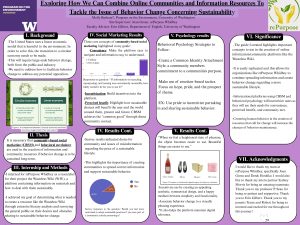Exploring How We Can Combine Online Communities and Information Resources To Tackle the Issue of Behavior Change Concerning Sustainability
The United States uses a linear economic model to guide our consumption patterns. This model is toxic and harmful to the environment, with planetary boundaries like pollution and the biosphere showing breaches at dangerous levels. This creates a need to change our lifestyles and consumption patterns to be sustainable. The goal of this project was to identify methods that are successful in creating and maintaining behavior change and use them as a guide for creating online platforms that host both information and community. To identify these methods, I conducted extensive literary research on behavioral psychology and marketing tactics. Additionally, I created a survey to explore the public’s views on community and behavior change. A resource like this must be designed in a way that combines techniques from community-based social marketing and behavioral psychology. Demonstrating a social imperative, highlighting economic self-interest, making behavior change convenient, and fostering common identity attachments will be successful in facilitating sustainable transitions. I created a guide detailing these key elements and more to give a precise outline for creating a social information resource. This will be important as society continues to turn towards the internet for information. Resources like the Wasteless Wiki, my main assignment for rePurpose Whidbey, can be localized and replicated, and my guide helps provide an outline for those who aim to do that. People will be more inclined to make the switch to a sustainable lifestyle when they see their peers discussing and pursuing that online and in person.
